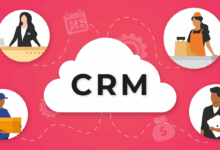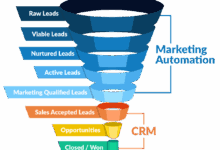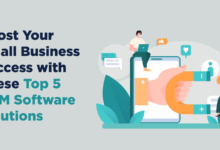CRM with AI Chatbot Integration
CRM with AI Chatbot Integration represents a significant advancement in customer relationship management. This powerful combination leverages artificial intelligence to automate tasks, personalize interactions, and ultimately enhance customer engagement and satisfaction. By seamlessly integrating AI-powered chatbots into existing CRM systems, businesses can streamline workflows, improve lead generation, and gain valuable insights into customer behavior. This exploration will delve into the functionalities, benefits, implementation strategies, and future trends of this innovative technology.
This integration offers a multitude of advantages, from improved customer service responsiveness and increased efficiency to more effective lead nurturing and personalized marketing campaigns. Understanding the nuances of integrating AI chatbots, including addressing potential technical challenges and data security concerns, is crucial for successful implementation and realizing the full potential of this technology. We will examine various aspects of this integration, from the selection of appropriate chatbot types to the ongoing monitoring and optimization of the system for maximum impact.
Defining CRM with AI Chatbot Integration
A Customer Relationship Management (CRM) system, at its core, is a software designed to manage and analyze customer interactions and data throughout the customer lifecycle. It helps businesses understand customer needs and behaviors, improve customer service, and ultimately boost sales and revenue. Integrating AI-powered chatbots significantly enhances these capabilities, providing a more efficient and personalized customer experience.
Core Functionality of a CRM System
CRM systems offer a wide range of functionalities, all geared towards optimizing customer interactions. These typically include contact management (storing and organizing customer information), sales force automation (managing sales processes and tracking opportunities), marketing automation (automating marketing campaigns and tracking results), customer service and support (managing inquiries and resolving issues), and reporting and analytics (providing insights into customer behavior and business performance). The specific features offered vary depending on the CRM system and its intended use.
Types of AI Chatbots Used in CRM Integration
Several types of AI chatbots are employed in CRM integration, each offering unique capabilities. Rule-based chatbots operate on pre-programmed rules and decision trees, responding to specific keywords or phrases. These are simpler to implement but lack flexibility. Machine learning (ML)-based chatbots learn from past interactions and improve their responses over time, offering more dynamic and personalized experiences. Natural language processing (NLP)-powered chatbots can understand and interpret human language more naturally, enabling more complex and nuanced conversations. Finally, hybrid chatbots combine elements of rule-based and ML-based approaches, leveraging the strengths of both.
Benefits of Integrating AI Chatbots with CRM
Integrating AI chatbots into a CRM system offers numerous advantages. Improved customer service is a key benefit; chatbots can provide instant support 24/7, handling routine inquiries and freeing up human agents to focus on more complex issues. Increased efficiency is another major advantage; automation of repetitive tasks reduces workload and improves response times. Personalized customer experiences are enhanced through the ability of AI chatbots to tailor interactions based on individual customer data. Finally, valuable data is collected from chatbot interactions, providing insights into customer preferences and needs that can inform business decisions.
Hypothetical Scenario Illustrating Practical Application
Imagine a large e-commerce company using a CRM system integrated with an ML-based chatbot. A customer, Sarah, visits the company’s website and has a question about shipping costs. The chatbot, powered by the CRM data, instantly recognizes Sarah as a returning customer with a past purchase history. It greets her by name and, based on her previous purchases and location, accurately provides the shipping cost for her current shopping cart. If Sarah has further questions, the chatbot can access her past interactions within the CRM, providing personalized and efficient support. If the chatbot cannot answer her question, it seamlessly transfers her to a human agent who already has access to Sarah’s complete interaction history through the integrated CRM. This seamless transition ensures a smooth and personalized customer experience, highlighting the power of CRM and AI chatbot integration.
Benefits and Use Cases
Integrating AI chatbots into your CRM system offers a significant boost to efficiency and customer satisfaction. This integration leverages the power of automation and intelligent data analysis to streamline processes and personalize customer interactions, ultimately leading to improved business outcomes. The benefits extend across various departments, from sales and marketing to customer support and beyond.
AI chatbots enhance customer service within a CRM by providing immediate, 24/7 support, answering frequently asked questions, resolving simple issues, and escalating complex problems to human agents efficiently. This reduces wait times, improves response rates, and frees up human agents to focus on more intricate tasks, leading to greater overall efficiency and improved customer satisfaction.
Industries Benefiting Most from AI Chatbot Integration
Several industries see substantial benefits from this integration. E-commerce businesses, for example, can use chatbots to handle order tracking, returns, and product inquiries, improving customer experience and reducing the burden on customer service teams. The financial services sector can leverage chatbots to provide account information, process transactions, and offer personalized financial advice. Healthcare providers can use chatbots to schedule appointments, answer patient questions, and provide medication reminders, improving patient engagement and adherence to treatment plans. Finally, the travel and hospitality industry uses chatbots for booking assistance, itinerary management, and providing real-time travel updates, enhancing customer convenience and satisfaction.
AI Chatbots Enhancing Customer Service within a CRM
AI chatbots significantly enhance customer service by automating routine tasks and providing personalized interactions. They can instantly respond to customer queries, regardless of time zone or volume, ensuring immediate assistance. Through natural language processing (NLP), they understand and respond to customer requests in a conversational manner, creating a more engaging and human-like experience. Furthermore, CRM integration allows chatbots to access customer data, enabling them to provide personalized recommendations, targeted offers, and tailored support. This data-driven approach enhances customer engagement and fosters stronger relationships. By identifying customer sentiment and intent, chatbots can proactively address issues and prevent potential problems, leading to improved customer loyalty and reduced churn.
Case Studies Demonstrating Improved Customer Engagement
A leading e-commerce company implemented an AI chatbot within its CRM, resulting in a 20% reduction in customer service call volume and a 15% increase in customer satisfaction scores within six months. Another case study showcases a financial institution that used AI chatbots to automate account inquiries, leading to a 30% decrease in average handling time for customer service representatives and a 10% increase in customer retention. These examples highlight the tangible impact of AI chatbot integration on key performance indicators.
Return on Investment (ROI) Comparison
The following table compares the estimated ROI of CRM systems with and without AI chatbot integration, considering factors such as reduced operational costs, improved customer satisfaction, and increased sales conversion rates. These figures are based on industry averages and may vary depending on specific implementation and business context.
| Metric | CRM without AI Chatbot | CRM with AI Chatbot | Difference |
|---|---|---|---|
| Customer Service Costs | $100,000 | $70,000 | -$30,000 |
| Customer Satisfaction Score | 75% | 85% | +10% |
| Sales Conversion Rate | 10% | 15% | +5% |
| Estimated ROI (Year 1) | 15% | 25% | +10% |
Implementation and Integration Challenges
Integrating AI chatbots into existing CRM systems presents a unique set of challenges, requiring careful planning and execution to ensure a smooth and successful implementation. These challenges span technical hurdles, data security concerns, and the overall implementation process itself. Overcoming these obstacles is crucial for realizing the full potential of AI-powered CRM.
Technical Integration Challenges
Integrating an AI chatbot seamlessly into an existing CRM system often involves navigating complex technical landscapes. The chatbot’s architecture must be compatible with the CRM’s API and data structures. This might necessitate custom coding, API adjustments, or the use of middleware to bridge the gap between the two systems. Difficulties can arise from data format inconsistencies, differing authentication protocols, and the need to manage real-time data synchronization between the chatbot and the CRM database. For instance, integrating a chatbot built on a proprietary platform with a Salesforce CRM might require extensive custom development to ensure bidirectional data flow and maintain data integrity. Another potential challenge involves scaling the chatbot’s infrastructure to handle peak demand without compromising performance or response times. A poorly planned integration can lead to slow response times, system instability, and ultimately, user frustration.
Data Security and Privacy Considerations
The integration of AI chatbots into CRM systems raises significant data security and privacy concerns. Customer data, including personally identifiable information (PII), is often highly sensitive and requires robust protection. Implementing appropriate security measures is paramount to prevent data breaches and comply with relevant regulations such as GDPR and CCPA. Strategies for mitigating these risks include encrypting data both in transit and at rest, implementing access control mechanisms to restrict access to sensitive data, and conducting regular security audits to identify and address vulnerabilities. Furthermore, the AI chatbot itself needs to be designed with privacy in mind, ensuring that data is handled responsibly and in accordance with best practices. This might involve anonymizing data where possible, using differential privacy techniques, and providing users with clear and transparent control over their data. Failure to adequately address these concerns can result in legal penalties, reputational damage, and loss of customer trust.
Implementation Process Steps
A typical implementation process for AI chatbot integration into a CRM system generally involves several key stages. Firstly, a thorough needs assessment is crucial to define the specific goals and objectives of the integration. This involves identifying the desired functionalities of the chatbot, the target user groups, and the key performance indicators (KPIs) to measure success. Secondly, the selection of an appropriate AI chatbot platform and integration strategy is essential. Factors to consider include the platform’s capabilities, scalability, security features, and integration options with the existing CRM system. Thirdly, the development and customization of the chatbot are required, tailoring its responses and functionalities to meet the specific needs of the business. This includes training the chatbot on relevant data, defining conversational flows, and configuring its integration with the CRM’s data sources. Fourthly, rigorous testing and quality assurance are needed to ensure the chatbot’s performance, accuracy, and security. This involves testing various scenarios, identifying and resolving bugs, and ensuring compliance with data security and privacy regulations. Finally, deployment and ongoing monitoring are critical for ensuring the continued success of the integration. This involves deploying the chatbot to the production environment, monitoring its performance, and making adjustments as needed based on user feedback and performance data.
Key Considerations for Successful Integration
Several key considerations are essential for successful AI chatbot integration into CRM systems. Firstly, choosing the right chatbot platform that aligns with the business’s specific needs and technical infrastructure is paramount. Secondly, careful planning and design are crucial to ensure the chatbot’s functionality, usability, and integration with existing systems. Thirdly, a robust data security and privacy strategy is necessary to protect sensitive customer data. Fourthly, thorough testing and quality assurance are essential to identify and resolve issues before deployment. Fifthly, ongoing monitoring and maintenance are critical for ensuring the chatbot’s continued performance and effectiveness. Finally, investing in appropriate training for staff to effectively manage and utilize the integrated system will maximize its benefits. Failure to address these considerations can lead to integration challenges, poor user experience, and ultimately, a failed implementation.
Features and Functionality of AI Chatbots in CRM
AI-powered chatbots are transforming CRM systems, enhancing efficiency and improving customer experiences. Their capabilities extend far beyond simple automated responses; they offer sophisticated features that streamline workflows, personalize interactions, and drive business growth. This section will explore the key functionalities of AI chatbots within a CRM context, focusing on their impact on lead generation, customer interaction, and task automation.
AI Chatbot Features for Lead Generation and Qualification
Effective lead generation and qualification are crucial for sales success. AI chatbots significantly improve this process by acting as a 24/7 lead capture system. They can engage website visitors through proactive chat windows, qualifying leads based on pre-defined criteria such as industry, company size, or expressed needs. For example, a chatbot might ask a series of qualifying questions, filtering out unqualified leads and routing high-potential leads directly to the sales team. This immediate qualification saves valuable sales time and resources. Furthermore, chatbots can collect valuable lead information, such as email addresses and phone numbers, automatically populating the CRM with detailed lead profiles.
AI Chatbot Personalization of Customer Interactions
Personalization is key to building strong customer relationships. AI chatbots excel at delivering personalized experiences within the CRM. By accessing customer data stored within the CRM, chatbots can tailor their responses and interactions to individual customer preferences and past interactions. For instance, a chatbot can address a returning customer by name, referencing previous purchases or support requests. This level of personalization fosters customer loyalty and strengthens the brand-customer relationship. The chatbot can also proactively offer relevant product recommendations or support based on the customer’s history and behavior.
AI Chatbot Automation of Repetitive CRM Tasks
AI chatbots are highly effective at automating routine and repetitive tasks within the CRM workflow, freeing up human agents to focus on more complex issues. This automation includes tasks such as scheduling appointments, sending follow-up emails, answering frequently asked questions, and providing basic troubleshooting assistance. For example, a chatbot can automatically send appointment reminders, reducing no-shows and improving scheduling efficiency. It can also respond to common inquiries about shipping, order status, or product information, providing immediate answers without human intervention. This automation not only improves efficiency but also ensures consistent and timely responses to customer requests.
AI Chatbot Handling of Customer Inquiries and Support Requests
AI chatbots can handle a wide range of customer inquiries and support requests, providing instant support and resolving issues quickly and efficiently. They can access and process information from the CRM to provide accurate and relevant answers. For example, a chatbot can retrieve order details, track shipping information, or provide troubleshooting steps for technical issues. By handling common inquiries, chatbots reduce the workload on human support agents, allowing them to concentrate on more complex problems requiring human expertise. Furthermore, chatbots can escalate complex issues to human agents seamlessly, ensuring a smooth and efficient customer experience.
Future Trends and Developments
The integration of AI chatbots within CRM systems is rapidly evolving, driven by advancements in natural language processing (NLP), machine learning (ML), and other emerging AI technologies. This section explores the anticipated impact of these advancements and offers predictions for the future of AI-powered CRM.
The next five years will witness a significant shift in how businesses leverage AI-powered CRM. We can expect a move beyond basic chatbot functionality towards more sophisticated, personalized, and proactive customer interactions. This will be fueled by the increasing sophistication of AI algorithms and the wider availability of large datasets for training.
Impact of Emerging AI Technologies
Several emerging AI technologies will significantly influence the future of CRM chatbot integration. For instance, advancements in NLP will allow chatbots to understand nuanced language, context, and sentiment with greater accuracy, leading to more natural and human-like conversations. Similarly, progress in ML will enable chatbots to learn from past interactions, adapt to changing customer needs, and personalize responses more effectively. The rise of generative AI models will empower chatbots to create more dynamic and contextually relevant responses, exceeding the capabilities of rule-based systems. This includes generating personalized product recommendations, crafting tailored marketing messages, and even proactively addressing potential customer issues before they escalate. Furthermore, the integration of computer vision will allow chatbots to analyze visual data, such as product images or customer uploaded documents, adding another layer of intelligence and improving customer service efficiency.
Predictions for the Future of AI-Powered CRM Systems
Over the next five years, we predict several key developments in AI-powered CRM systems. Firstly, hyper-personalization will become the norm. Chatbots will leverage customer data to anticipate needs and proactively offer relevant solutions, moving beyond reactive support to predictive engagement. Think of a chatbot anticipating a customer’s need for a product refill based on their past purchase history and usage patterns, proactively offering a replenishment option. Secondly, omnichannel integration will become seamless. Chatbots will be accessible across all customer touchpoints – websites, mobile apps, social media, and email – providing a consistent and unified experience. Thirdly, we expect to see an increased reliance on AI-driven insights for business decision-making. CRM systems will not only manage customer interactions but also analyze the data generated to identify trends, predict future behavior, and optimize business strategies. For example, analyzing chatbot interaction data can reveal customer pain points, leading to product improvements or service enhancements. Finally, the rise of ethical AI will be paramount. Businesses will increasingly focus on ensuring their AI-powered CRM systems are transparent, unbiased, and respect customer privacy.
Conceptual Illustration of CRM Evolution
Imagine a visual representation spanning five years. Year 1 depicts a basic chatbot in a CRM system, primarily handling frequently asked questions (FAQs) with limited natural language understanding. Year 2 shows the chatbot integrating with other CRM functionalities, offering basic personalized recommendations. Year 3 illustrates the chatbot utilizing sentiment analysis to adapt its responses based on customer emotions, improving the customer experience. Year 4 shows a sophisticated chatbot proactively engaging customers, anticipating their needs based on predictive analytics. By Year 5, the illustration showcases a fully integrated, omnichannel chatbot powered by generative AI, capable of handling complex tasks, generating creative content, and seamlessly integrating with various business processes. The evolution reflects a progression from simple, reactive chatbots to highly intelligent, proactive virtual assistants deeply embedded within the CRM ecosystem. This progression mirrors the evolution of AI capabilities, moving from rule-based systems to sophisticated machine learning and generative AI models.
Summary
In conclusion, the integration of AI chatbots with CRM systems marks a transformative shift in how businesses manage customer relationships. By automating routine tasks, personalizing interactions, and providing instant support, these systems significantly enhance customer experience and drive business growth. While implementation requires careful planning and consideration of potential challenges, the long-term benefits of increased efficiency, improved customer satisfaction, and valuable data-driven insights make CRM with AI chatbot integration a worthwhile investment for businesses seeking a competitive edge in today’s dynamic market. The future of this technology promises even more sophisticated capabilities, further blurring the lines between human and artificial interaction while maintaining a personalized and efficient customer journey.





